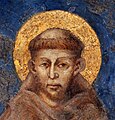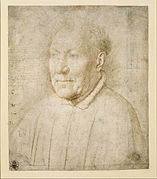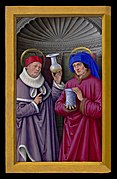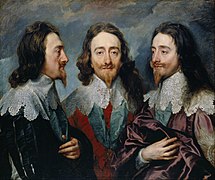Portal:Saints
Portal:Saints
|
THE SAINTS PORTAL
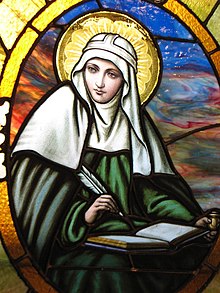 In Christian belief, a saint is a person who is recognized as having an exceptional degree of holiness, likeness, or closeness to God. However, the use of the term saint depends on the context and denomination. In Catholic, Eastern Orthodox, Anglican, Oriental Orthodox, and Lutheran doctrine, all of their faithful deceased in Heaven are considered to be saints, but some are considered worthy of greater honor or emulation. Official ecclesiastical recognition, and consequently a public cult of veneration, is conferred on some denominational saints through the process of canonization in the Catholic Church or glorification in the Eastern Orthodox Church after their approval. While the English word saint originated in Christianity, historians of religion tend to use the appellation "in a more general way to refer to the state of special holiness that many religions attribute to certain people", referring to the Jewish ḥasīd or tzadik, the Islamic walī, the Hindu rishi or Sikh Bhagat and guru, the Shintoist kami, the Taoist shengren, and the Buddhist arhat or bodhisattva also as saints. Depending on the religion, saints are recognized either by official ecclesiastical declaration, as in the Catholic faith, or by popular acclamation (see folk saint). (Full article...)
William Wilberforce (August 24, 1759 – July 29, 1833) was a British politician and philanthropist. A native of Hull, Yorkshire, he began his political career in 1780 and became the independent Member of Parliament for Yorkshire (1784–1812). A close friend of Prime Minister William Pitt, in 1785 he underwent a conversion experience and became an evangelical Christian. In 1787 he came into contact with Thomas Clarkson and a group of anti-slave trade activists, including Granville Sharp, Beilby Porteus, Hannah More and Lord Middleton.
At their suggestion, Wilberforce was persuaded to take on the cause; he became one of the leading English abolitionists, heading the parliamentary campaign against the British slave trade, which he saw through to the eventual passage of the Slave Trade Act in 1807. In later years Wilberforce supported the campaign for complete abolition, which eventually led to the Slavery Abolition Act in 1833; this Act paved the way for the complete abolition of slavery in the British Empire. A tireless campaigner for the abolition of slavery, Wilberforce died just three days after hearing that the passage of the Act through Parliament was secure. He was buried in Westminster Abbey, close to his friend William Pitt. Various churches within the Anglican Communion commemorate Wilberforce in their liturgical calendars.
The following are images from various saint-related articles on Wikipedia.
 The Saints Wikiproject aims primarily at standardizing the articles about people venerated by some Christians as saints or the blessed and ensuring quality articles. If there is an interest in including saints from religions other than Christianity, please propose those changes on our talk page. Saints: Saint Michael - Saint Gabriel - Virgin Mary - Saint Joseph - Saint John the Baptist - Saint Stephen - Saint Peter - Saint Paul - Saint Augustine of Hippo  Traditions: Calendar of saints - Hagiography - List of saints - Symbology of the Saints Theology: Communion of Saints - Intercession of saints - Martyrs - Patron saint Roman Catholicism: Congregation for the Causes of Saints - Servant of God - Venerable - Beatification - Canonization Muslim Sufi saints: 'Abd al-Qadir al-Jilani - Ahmad al-Rifa'i - Ibrahim al-Disuqi - Ahmad al-Badawi - Al-Shadhili - Baha' al-Din Naqshband - Ibn 'Arabi - Wali Sanga
The following Wikimedia Foundation sister projects provide more on this subject:
Discover Wikipedia using portals |






